#doldrey
Explore tagged Tumblr posts
Text
Doldrey — Only Death Is Eternal (Iron Lung)
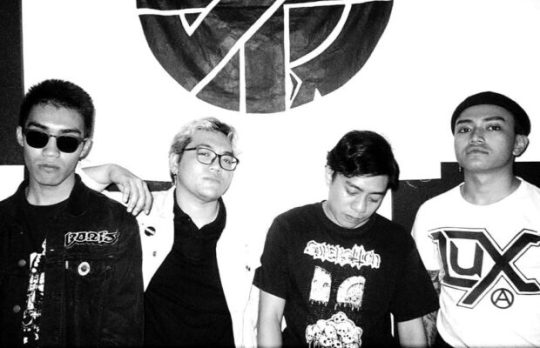
Only Death Is Eternal, the new tape from crusty death metal band Doldrey, is among the most thrilling, hugely satisfying releases from the metal underground so far this year. Unstaunched energy, massively chunky riffage, a general sensibility that’s as nasty as it is raw and exciting — all those things characterize Doldrey’s sound more or less adequately, but we’ve heard those words before, and none of them captures what’s so engaging and immediate in these songs. The sorta-stale typicality of those descriptors is complemented by the symbolics of the band’s output; all the muscled warriors and carnage in the titles and j-card art operate somewhere very remote from our everyday realities. But somehow Only Death Is Eternal is right there, fitted into the most aggro contours of the current conjuncture. It’s a terrific record.
Likely Doldrey would be wise to approach the ideological problematics of our social moment with some tentative, distant maneuvering. The band is from Singapore, and while young men are no longer subject to arrest if they wear their hair a bit long in that city-state, its dominant culture and legal-juridical apparatus still skew strongly toward the conservative. Death metal and especially crust (with that subgenre’s strong orientation toward lefty radicalism) are likely perceived as expressions of undesirable politics, and of aberrant personality.
Hence, perhaps, Doldrey’s semiotics, most of which can be traced to Kentaro Miura’s manga Berserk. (Doldrey, I am told, is the name of a fortress important in one of the long-running comic’s early narrative arcs.) That explains the swords-and-sorcery proclivities of the band’s album art and the overheated language of some of its song titles: “Blood of the Serpent,” “Torture Paradise,” “All Is Hell.” Those read like a middle-schooler’s sense of the profound, or of the profoundly brutal, if that middle schooler had been brought up on a steady diet of Conan the Barbarian, Moorcock’s Eternal Champion stories and, well, Berserk.
The nerd-factor associated with piles of mass-market paperbacks and endless trips to the comic book shop is effective cover. And maybe it’s not really (or not just) cover. Berserk’s most emphatic symbolic element is its pervasive and hyper-graphic violence, some of which has disturbing scope and awfully imagined cruelty. Doldrey’s music taps into some of that intensity, especially in the heaviness of its death metal buzz and thunder. Check out the middle section of “Moral Decay” or the last third of the title track. Still got all your teeth? Better turn it up louder. And try not to think about ongoing genocidal wars or immiserating modes of human exploitation when you do so. Good luck with that.
Beyond the implied fascination with bloodshed and the nods to Swedeath unpleasantness, it’s the crusty stuff that lifts the record into the musical midnight sun. This reviewer loves the forty or so seconds of flat-out intensity in the middle of “All Is Hell” (beginning just after the guitar solo) and the opening 90 seconds of “Societal Machine.” You can just about smell the filthy denim and feel the greasy leather, all crowding into a moldy basement space. And in that crush of bodies, you’re happy about it all: the smell, the feel, the sense of being among like-minded freaks. Allies, as it were.
None of that will dispel the nightmare that is 2024’s ongoing tilt toward fascism, a mind-boggling combo of scenes as awful as the race-rioting in the UK and as stupid as Hulk Hogan ripping open his tee shirt on the RNC podium. Berserk? Yes, but also all too real. Doldrey has our soundtrack ready.
Jonathan Shaw
#doldrey#only death is eternal#iron lung#jonathan shaw#albumreview#dusted magazine#metal#death metal#crust metal
2 notes
·
View notes
Text
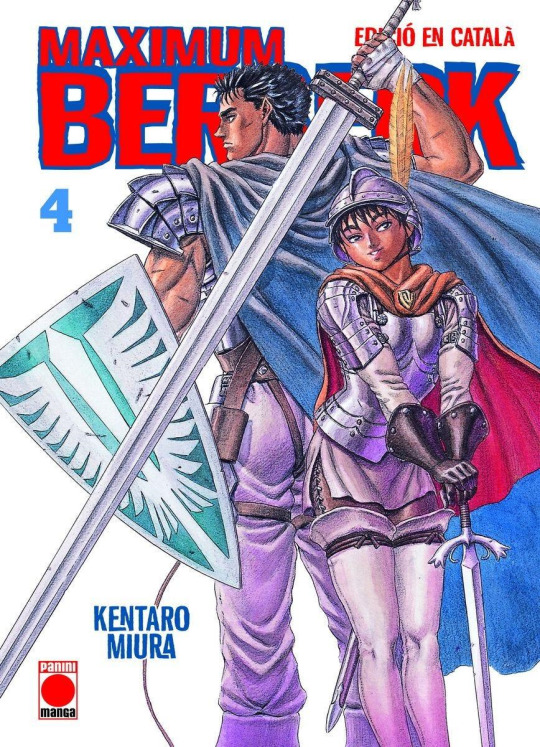
Coberta del quart volum de l'edició catalana de Berserk, versió ‘Maximum’, que conté Casca (part 3), Disposats a morir (parts 1, 2, 3), El retorn, Fogueres de somnis, La batalla de Doldrey (parts 1, 2, 3, 4, 5, 6), Retorn triomfant, El moment de glòria, Làpida de foc (parts 1 i 2), En una nit de neu..., L'alba de la partida (parts 1, 2, 3).
#llibre#coberta#manga#en català#Berserk#Kentaro Miura#fantasia#fantasia èpica#espasa i fetilleria#fantàstic#Guts#Casca#Disposats a morir#El retorn#Fogueres de somnis#La batalla de Doldrey#Retorn triomfant#El moment de glòria#Làpida de foc#En una nit de neu...#L'alba de la partida#còmic#narrativa
1 note
·
View note
Text
griffith, we used to love griffith didnt we? handsome guy with a big dream. some says its a crazy dream, but they call him the white phoenix general now. thats what theyre calling him now after his Big Day at doldrey. but its not all sunshine in the band of the hawk is it? guts, his Big Guy, left him and now hes being, well, very nasty with princess charlotte
672 notes
·
View notes
Text

Griffith bathing in river next to Doldrey fortress after he had spent the night with Lord Gennon.
727 notes
·
View notes
Text

the only time griffith smiles throughout the ball after the battle of doldrey is when he sees guts 💫
30 notes
·
View notes
Text
Casca has never had a bad set of armor. All of her golden age armors slay, all of her flashback armors slay. She pulls off her disguise to infiltrate Doldrey (in the movies), her green and brown Elfhelm armor and her 2016 anime eclipse armor (I've seen that screenshot and her armor design is the best thing about it). Even her design as Elaine automatically becomes better the moment you put chainmail on her. We should appreciate how well Miura designed Casca's armors more often since they're all beautiful without sacrificing practicality.
#casca#casca's outfits#berserk#also we need to give Casca more armor#I just hope the new studio artists in charge of the manga design Casca's future armors as well as Miura did#and don't make sexy armor for Casca because she's already beautiful in all of her normal armors already#honestly armor as is is inherently sexy and one day I'm gonna make a post on that#ash speaks
63 notes
·
View notes
Text
Gut's Daimon

The Beast of Darkness is offering Guts powers in exchange for yielding himself. Which begs the question to what it is.

It seems like it's more then a figment of Guts imagination since Griffith noticed its presence which is significant.

I have a theory that it is a daimon. Daimons are high class spirits that exist in deep domain of the Astral World. With some of them being humans.
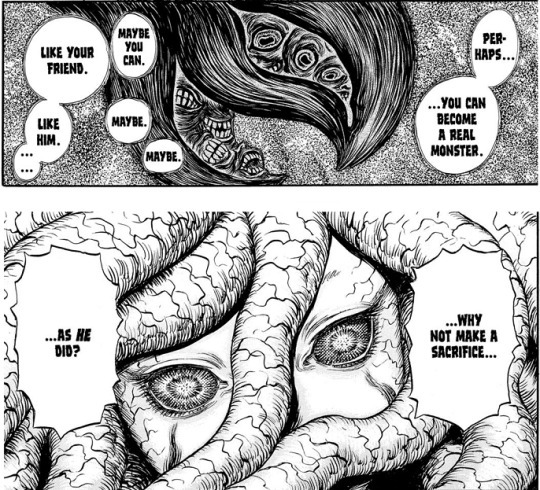
It has been suggested a couple of times that Guts will use the Beherit. But I think there will be a twist and that Guts is already a reincarnation. I think the Beast was a daimon that reincarnated into Guts.
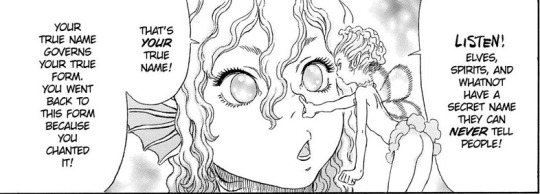
I think the Beast's offer is to tell Guts his true name so he can transform and gain power.
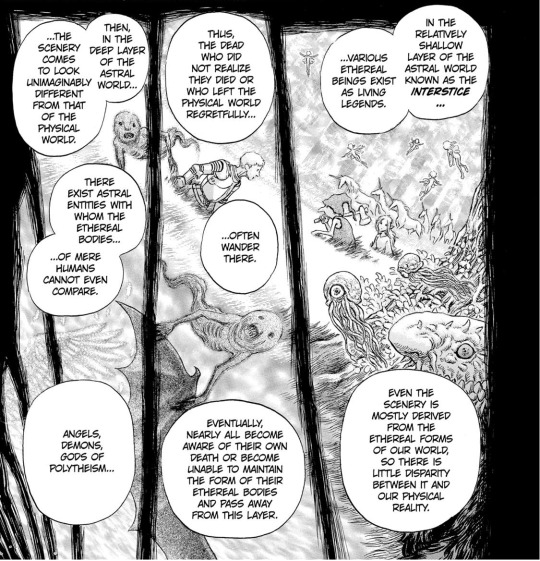
There is an evil opposite of a daimon called a kaikodaimon I think that is what the Beast is. The Astral World is split into light and darkness. And I think Flora hinted at it when she said demons and angels in the deeper layer of the Astral World which is where the Daimons reside.

The Beast of Darkness takes the form of a canine and I think there is a link to the Black Dog Knights.
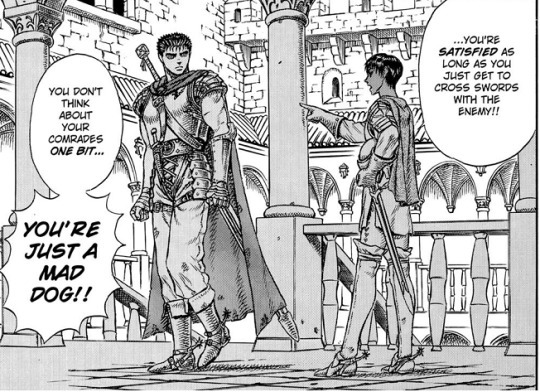
Also Guts was called a mad dog by Casca.

And appeared as a dog in Casca's dream world.
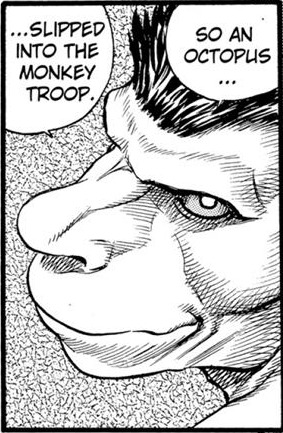
It's odd that Wyald named his unit the Black Dog Knights even though he looks like a monkey. Not only is he called one by others but acknowledges it himself.

During his fight with Guts Wyald states that he hadn't been hurt that bad in a hundred years.
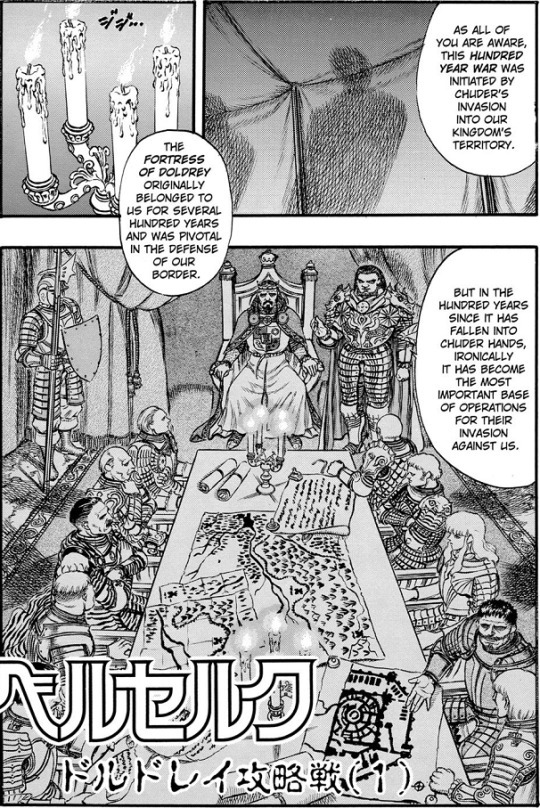
Which is when the Midland-Tudor War started, I don't think this is a coincidence.
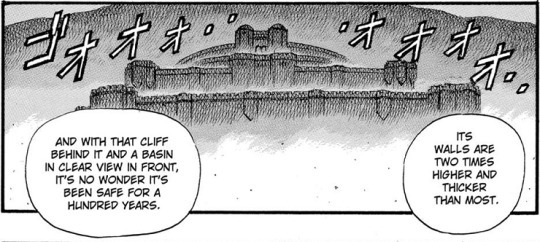
I think the Beast was the original of commander/lord of Doldrey who dressed in dog shape armor. I think Wyald helped Tudor capture Doldrey and the Beast inflicted that would on him. I think Wyald adopted his moniker in homage/mockery. I think after dying he became a daimon.
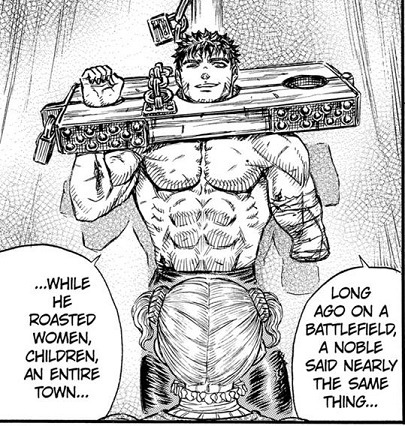
I think he was mentioned by Guts as the noble who roasted women, children and entire town. I don't think this tidbit was random I think it's important.
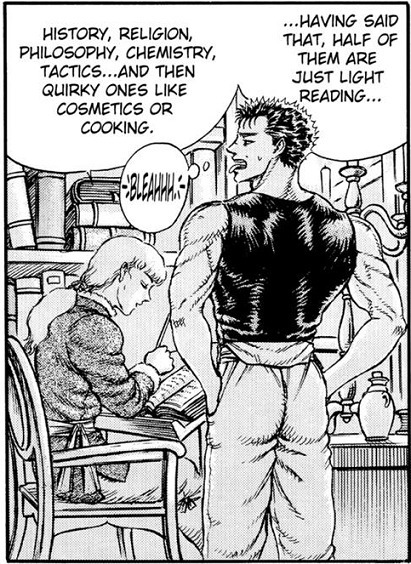
I think he got the info from Griffith who studied history. Or Guts read about it himself to learn the history of Doldrey in preparation for that battle.
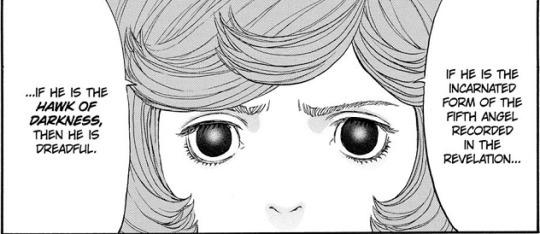
Guts depicts this noble as a zealot which I think is one reason why the Beast reincarnated and wants to kill Griffith. Griffith is an enemy to the church, their scripture warns about Griffith's coming.
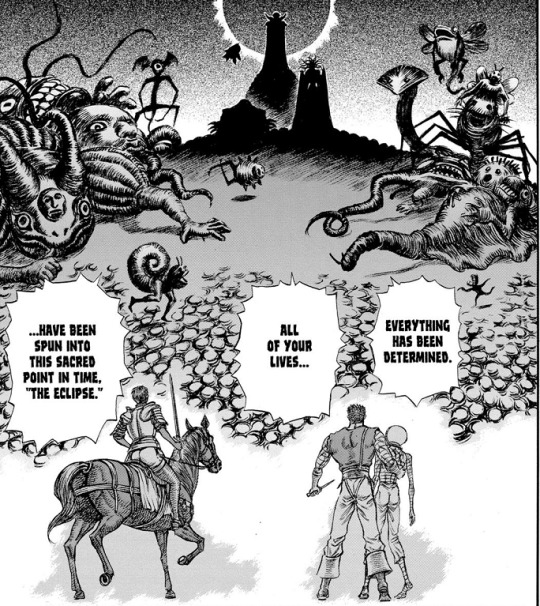
Also I think he wants revenge for the fall of Doldrey. I think the God Hand manipulated those events in their grand plan which is why Wyald was there.
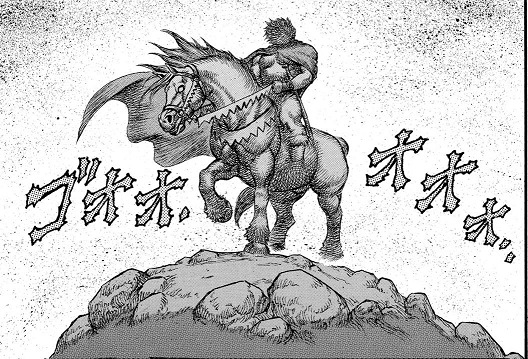
There is precedent Zodd intervened in Guts' battle to ensure the Eclipse happened.
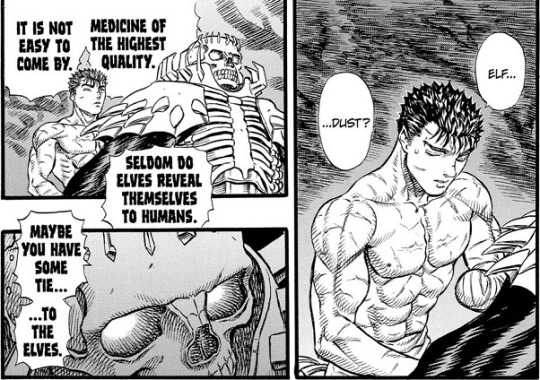
Skull Knight mentioned that Guts might have some ties to the elves. I think the Beast went to them to reincarnate.
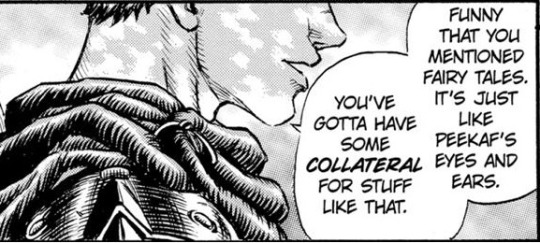
The Peekaf story showed that elves can grant wishes similar to the God Hand. And most of the things in that story ended up being true, an example being time dilation.
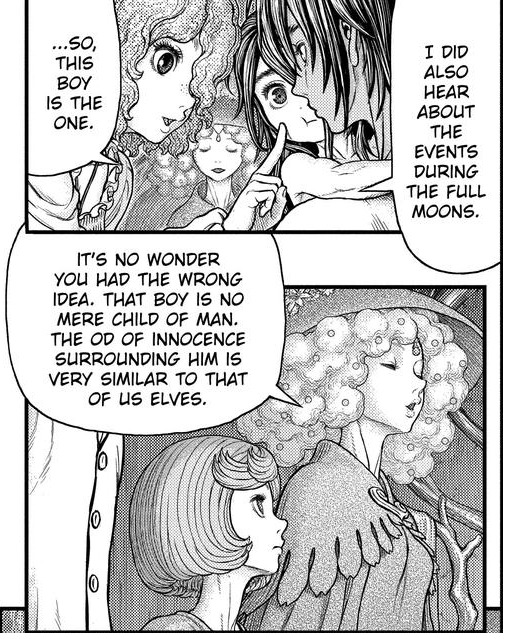
A hole in my theory is Schierke not noticing this but a person's Od can be hidden. Danann could not sense Griffith within the Moonlight Boy.
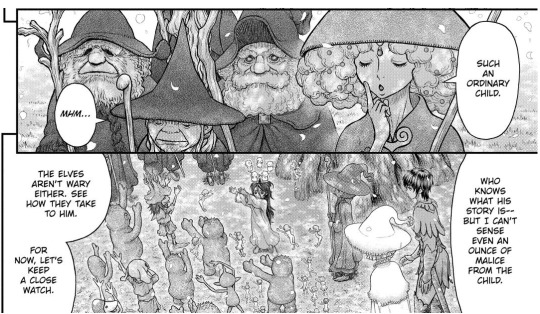
Along with the witches they couldn't figure out what the Moonlight Boy was.
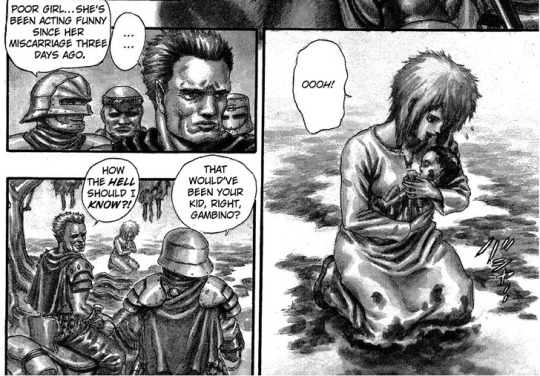
Another headcanon I have is that Gambino's and Shisu's biological son was meant to become Griffith's other half. I thought Guts might have been a replacement used to mess up the God Hand's plans. He is reminiscent of a changeling and Guts has a potential link to the elves.
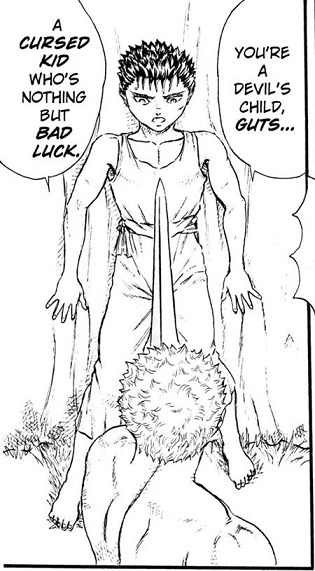
And he was called a devil's child by Gambino which is one of the definitions of a changeling.
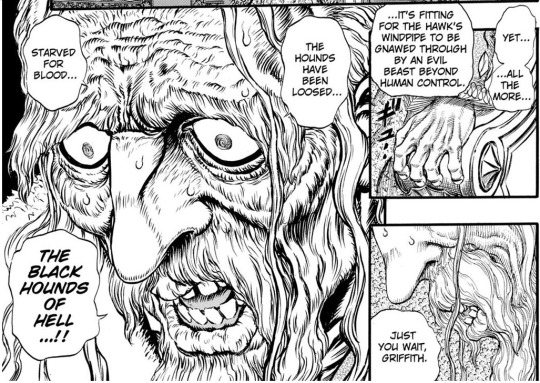
I think it will be massive callback to the King's statement about how would be fitting for Griffith to be killed by the black hounds of Hell.

I think the Beast is also inspired by the tiangou a mythological black dog that is capable of eating the moon. The moon is uses to represent the power of causality/the God Hand.
29 notes
·
View notes
Text






Berserk: The Golden Age Arc II - The Battle for Doldrey
ベルセルク 黄金時代篇II ドルドレイ攻略 (2012)
#Berserk: The Golden Age Arc II#Berserk#ベルセルク 黄金時代篇II ドルドレイ攻略#ベルセルク#Toshiyuki Kubooka#Kentaro Miura#窪岡俊之#三浦建太郎#japan#movie#gif#2012
7 notes
·
View notes
Note
what do you think of the take that the amount of rape is justified because it’s realistic, as in real life sadly women and children do get raped and SAd a lot more especially during wars, and realistically, sadly it’s usually very hard for them to fight back against this and stop it from happening. (Let’s ignore the way it is depicted in the manga for sake of discussion btw, though I know it’s kind of hard to do that here lol). I’ve seen it argued that berserk is actually very feminist in this regard because it doesn’t shy away from showing how depraved and cruel men are to women and how rapey a lot of them would be if there was nothing holding them back from acting on their dark impulses.
lol well ignoring how Berserk does it, I think theoretically a work of fiction can be full of rape and successfully come across as realistic. It can indeed add to a dark, gritty tone. But I think it ought to do more than that to justify being included in a story. If a scene is only doing one thing for the story (such as adding to the realistic tone) then imo it tends to feel shallow. When that scene is rape, it's extra egregious because when a rape scene feels shallow and tacked on, it becomes potentially quite offensive. And whatever else it does should complement the first goal, rather than contradict it, so eg turning the audience on works at cross-purposes to establishing a realistic tone. If the rape said something about a character, or contributed to a theme, or the plot, or worldbuilding, etc then it can get points for adding to a realistic tone in addition, imo.
You can also reference rape as a danger in a certain dark, gritty setting without constantly depicting it as set-dressing, which also helps establish a realistic tone without risking crossing over into gratuitous, laughable porn territory.
Like, basically if a work is full of rape, I would expect that rape to be in the story because the story is about rape in some way. If it's solely to add realism, then it's going to feel exploitative and cheap, rather than realistic, imo.
Now, to be fair to Berserk lol, arguably it is about rape to some extent, like thematically. I actually got no beef with Berserk as a story having a lot of rape in it, again in theory. It also ticks another personal box of mine in terms of rape-as-realism, ie male characters get raped and/or sexually threatened as well. Not as often, granted, but it's more than most rape-fest stories manage. Realistically, in areas like war zones or other sites of conflict, men are statistically in much greater danger of rape, which is something a lot of 'rape is realistic!' arguments like to ignore.
(Relatedly, I once read and enjoyed this essay about the rape as realism argument. I'd recommend it.)
So like, Berserk is the kind of story that I think could get away with having a lot of rape in it. In terms of theme it's about trauma, abuse of power, exploitation, etc. Both our male protags have been raped, and in fact I quite like that for a chunk of the story Casca was the only one out of the three central characters who hadn't been raped, even if she does get threatened with it like fifty times.
Donovan telling Guts it happens all the time in armies is, imo, a good moment of dark realism. Casca's attempted assault while running from the 100 man fight, eg, also strikes me as largely realistic. Gennon's too much of a flat homophobic caricature to take seriously as a realistic predator imo, but the way he preys on Griffith's guilt complex and need for money feels realistic to me.
Buuut it eventually starts to get silly lol. A prolonged setpiece with a monster tearing off Casca's clothes and nearly raping her until Guts cuts off his dick complete with funny quipping doesn't do much to add realism to the story. Adon's overlong screeds about how he's going to turn Casca into a sex toy are practically used as comic relief during the Doldrey fight, rather than realism. And why is Casca the only one who gets raped by monsters during the Eclipse? Rape is about power, and when you have a whole host of powerful beings driven by their darkest urges during a ceremony called a 'festival' and a whole party of helpless victims for them, it defies belief to me that only the woman is subject to rape.
Also the way p much every dude Casca encounters post-Eclipse tries to rape her is unrealistic in the opposite way lol, I truly do not think men even in the middle ages were all uniformly rapists when given a convenient victim. Or the bandits who threaten Jill with rape - they're campy cartoon caricatures, it's hardly a realistic scene even ignoring the possessed tree.
etc etc
Realism is only a reason for including rape if the depiction is also realistic, and if the tone is striving for realism (which tbh Berserk often is not), and if the amount of rape actually does feel realistic rather than wildly exaggerated for the sake of drawing naked background women.
I think Miura also realized this considering how heavily he cut back on the rape at a certain point. Like, eg does the Millenium Falcon arc feel less realistic because Farnese hasn't been threatened with rape a bunch of times? Should one or both of the kids have a csa backstory for the sake of realism?
Also I don't think it's feminist to write men as if they're all rapists-in-waiting, I think that's actually pretty anti-feminist. It's one thing to acknowledge that men are statistically more likely to commit rape than women, and against women, but writing men like deep down they're all horndogs who just can't resist an easy victim, again like how 9/10 men Casca encounters in the Conviction arc try to rape her, shifts the blame from social and institutional power dynamics enabling abuses of that power (ie patriarchy) to biology, which is bs and counter to feminist goals (outside of some subsets of radical feminism.)
Anyway, yeah. Basically my take is that if you're adding rape to a story for the sake of realism, the depiction and the actual amount of rape you add should also be realistic (there is such a thing as too much), and there should still be a point to it beyond realism. If it doesn't serve the story, it doesn't matter how realistic it is imo. And Berserk does it well sometimes, but usually fails in evoking realism.
23 notes
·
View notes
Text
Lord Genon losing the battle of Doldrey because of Griffith's beauty... like another Helen of Troy.
His battle strategy was "get Griffith, fuck the castle".
17 notes
·
View notes
Text
the berserk manga is so good im getting chills!! the art is amazinngggg. the battle for Doldrey is too awesome. is this where Griffith...? I sense a finality of sorts here.
6 notes
·
View notes
Text
Griffith's Relationships (3)
The White Hawk. The White Phoenix. The King of Falconia. The Savior. Femto. The Blessed King of Longing. Once, the greatest mortal to ever wield a sword. The bane of the Black Swordsman. The most beautiful man alive. Him with a stature nothing short of pure magnificence. You know him. You love to hate him. I’m talking about one of the greatest characters not just in manga, but in all of fiction: Griffith.
Griffith is one of many examples of how masterful Kentaro Miura was with a pen, be it pressing against a notebook or a panel. An incredibly written character, as complex as they can come, with some of the most complicated, deep, and tragic relationships I’ve ever seen put to any form of media.
Today, I’ll be discussing what is inarguably a core tenet of Berserk: Griffith’s relationships. With two exceptions, there is no dispute that Griffith’s relationships are not the singular most important part of the media he resides in, there is no debate over whether or not they are still crucial parts of understanding both Guts’ disposition, and the world of Berserk itself. Griffith’s different approaches to interacting with those in his vicinity warps the very world itself, and his whims shape the very nature of the conflicts the protagonist engages in.
Here, we will be discussing Griffith’s most important relationships through Berserk, how they shaped him, and what they explain about who he is and how he got to where he is now.
Part 1: The Boy, and The Hawks
Part 2: The Governor.
Part 3: The King.
Part 4: Charlotte.
Part 5: The Wings of the Hawk (1)
Part 6: The Wings of the Hawk (2)
______________________________________________________________
Part 3: The King
The man who lords over Midland is many things, but he is nothing if not faithful in Griffith’s ability to succeed. In the war council deciding what was to be done about Doldrey, what was once Midland’s greatest bastion against Chuder, and now was the home of the Holy Purple Rhino Knights and the base of operations of their assault on the very nation which originally owned the fort, Griffith alone is completely confident in the fact that the fort can be captured. Not only so, but he remains adamant through the meeting that he and his forces alone could best General Boscogn and his men. There is but one single voice to support The Band of the Hawk, a noble named Sir Laban. Laban puts their situation quite simply: a small force like the Hawks being bested in combat should do no damage to the entirety of Midland’s otherwise massive force of arms. Besides, the Hawks have shown prodigious ability, being undefeated until this point. There is no further harm in allowing them to attempt, even with their paltry 5,000 men, against the occupying force of 30,000 strong.
The king looks on at this circus amongst his advisors, lower lords, and generals, and has but a single statement to utter.
“Sir Griffith.
Was that sincere?”
And upon Griffith’s affirmation, he orders the Hawks to take Doldrey.
And upon Griffith’s orders, they do.
There is a celebration held when the Hawks return home. An armistice agreement is sent, signed from Chuder, and the war is over. The king is gracious, generous, putting Griffith as the White Phoenix General, and promoting all of the Hawk, now White Phoenix, division leaders to peerage. But this same night, tragedy strikes.
Griffith falls ill, nearly dying. Then, later on, as Griffith recovers, Charlotte is kidnapped, and returned, and the Queen dies, along with countless other nobles, in a fire that collapses a building. So much bloodshed, between moments of endless revelry. The King is stricken with grief and tragedy. An endless river of crimson flows, despite Midland finally being able to erect a dam to stop it. But as the King says later, “The monster named War is always seeking new blood, starting to brew itself anew”. And the King is still at war. Not with Chuder, not even the war with Kushan. But he is at war with that which soars on beams of light, whose wings flap with the strength of hurricanes but the delicateness of a gentle night’s breeze. He is at war with the very concept of Griffith. He is at war with the very sky that supports the White Hawk. But he does not yet know it.
Griffith, too, is stricken with tragedy. But it is not crimson that flows from Griffith, but azure.The tragedy of loss, loss beyond any tragedy he had experienced to this point. Every difficulty Griffith has encountered has since only served to strengthen his resolve, no matter how much it may be to his detriment. But this? This breaks him. And “this” is the abandonment of the Hawks, of himself, by Guts. Guts defeated Griffith in a single stroke in combat, earning back his life and his freedom. And Griffith, a man who has only known control and power as his substitutes for affection, is broken. And so, he goes out, in search of some meager amount of solace that something in the world can provide. And ultimately, he reaches the window of a certain someone, quite important to Midland, and even more so to the King himself. He reaches the window to the chambers of Princess Charlotte, daughter of the King of Midland.
But Griffith finds no solace here. Even inside the Princess, his thoughts, his eyes, wander to Guts. It haunts his vision, in every stroke, with every blink, every shudder, only makes him wish he had won that fight. Charlotte’s body is not a shrine to Griffith, nor even just another body to use. It is a tool to vent his frustration, to pour into the dissolving, unraveling of his very psyche. And this meltdown is witnessed by a rogue maid, peering through the keyhole in Charlotte’s doors to her chamber. And he is arrested as he flees the very next morning, sword not in hand.
And so, the two men meet. Face to face, but not as equals. Griffith, bound and chained, strung up on a board. The King, staring up at him as he hangs from his wrists attached to a rope on the ceiling, whip in hand. And the king confirms, as he tears Griffith’s skin apart, crack by crack, slit by slit, with each sewing of the whip, that Griffith’s dream was a mere moment away. That, despite his disgusting blood, if he had merely retained patience, he could have, perhaps, attained his dream. But instead, Griffith merely proved the rumors around the court correct. He was not a Hawk, but a vulture, waiting to pick at the scraps of opportunity left behind by the war. The King rants to Griffith, starting about the weight he holds on his shoulders, but slowly, steadily and horrifically veering towards his daughter. Towards her ignorance, at first, and then, her naivete. Then, her innocence. Then, finally, her impurity. How Griffith soiled her. How Griffith plucked from him the one flower he so desperately wanted. And that it was soiled, now that she had given herself up to him.
And something, in that moment, clicks for Griffith. Despite his wounds, despite the blood loss, his mind connects threads that weave together the full picture:
“That you…
Rather…
To have been with Princess Charlotte…
Would have had her yourself?
Don’t you want her to have you?”
And this breaks the King. To be exposed, even in the lowest levels of Midland’s deepest, darkest dungeon. Here, even in the pits of his shame, does a spotlight flash on him. In the darkness, beacons point directly at him, blinding him, searing him in his squalor, all aimed by the Hawk’s burning truth. His protection of Charlotte is, at least not in its entirety, not based in his love for her as his daughter. At least partially, if not more… he is motivated by his desire. He desires her, his own seed. And more, he knows this, and does nothing. He does not push himself because of it, or in spite of it. He merely sequesters her away from the world, putting it on her shyness, and tried not to be a better king, but to reach a place where he can enjoy her. His only motivation is his daughter, but it is not love; not the kind of love that makes one a good king, or a good man. The kind of love, of longing, of lusting that tears a man’s soul apart. And this has led the king to become a hollowed version of himself after the passing of his first wife.
And Griffith sees this. And he sees right through the King.
And the King does not enjoy this. He tears into Griffith, before leaving him to rot with the torturer. And then, he does exactly as Griffith claimed. He goes, observing his daughter in her doctor-enabled sleep. He obsesses over her, over her body. Over Griffith’s claim over her body. He lusts over her, over how she has grown so much into the shape of her mother before her. He obsesses over how Griffith lay claim to the very features that once belonged to his wife. And then, in her sleep, the King begins to molest her. And when she attempts to fight him off, eventually succeeding, it is Griffith’s name that Charlotte calls out. Even in the depths of his defeat, Griffith succeeds in towering over the king with the mere shadow of his presence.
They needed each other, from the start. The King needed someone able to truly fight, who could wield every ounce of conviction in their soul, and the souls around them, in order to turn around what had been raging for a century. And Griffith? Griffith needed a way into his dream. A way to have his kingdom. But through this, they both made terrible decisions. And ultimately, the king’s own lust betrayed him. If the King had even been able to come to terms with how he truly felt about his daughter, much less deal with it properly, things would not have turned out the way they had. Instead, ironically enough, the King’s wish that Griffith suffer in that following year, and his overprotective, obsessive lust for his daughter, turned Griffith into the very White Phoenix that he so desperately wished to eradicate the possibility of.
The King, in a very tangible way, caused the Eclipse. Caused his own downfall. And Griffith, cemented in a way by the life experience he had earlier on with the Governor, saw the King and Charlotte both as nothing but a stepping stone on the journey to his dream. And when he lost that? When he knew, beyond the shadow of a doubt, that there was no possibility for the King to be able to assist him any further in his pursuit of his dream? He cast him aside like a stone on the road, and nothing more. And he spoke the truth to the King. And ironically enough, this very betrayal between the both of them is what awarded him with the blood-soaked version of the dream he aspired to, but blood-soaked or not, he treats it as though it were his dream all the same.
Ultimately, I take Griffith’s relationship with the king as one of simple mutual benefit. And when the mutual benefit is lost, it reveals the two’s truer natures- The King as a coward, and a disgusting pig, and Griffith, as an almost supernatural studier of all around him. Griffith is corrupted by corruption, is truly turned evil by evil. Guts’ disappearance may have broken him, but The King’s betrayal is what put him in a state enough to ever perform the things he eventually does. But this is far from shocking or surprising. Broken men breed broken men, turn them into broken soldiers, and are caught off guard when they break. In this case, the only issue was that his breaking broke everything.
If the King did not long for his daughter with such powerful carnality, if he accepted what he assumed was to occur- as he says to Griffith, his eventual succession to the throne through Charlotte- then all of this tragedy could have been avoided. But the King destroyed Griffith, and his sins ultimately destroyed him. In this way, the two are almost parallels- both traitors to themselves. The only difference between the two of them is we see how it started for them both, and how they both suffer from it- we just have not seen how it ends for one.
#Griffith#Guts#Casca#Berserk#Midland#King of Midland#The way they both kind of break is interesting#specifically in relation to charlotte#and that the king's bitterness is#directly responsible for Griffith's reprehensibility#in a way
6 notes
·
View notes
Text
It's unlikely but possible that Griffith didn't notice Guts and Casca growing closer; it happened while he was busy with the Battle of Doldrey and then with the assassination. Even at their swordfight, he was so obsessed with winning by any means necessary that he acted completely different for the duration.
(Now, Mr. Cold and Calculating, Always Noticing Things missing such an important thing? Well, consider: the behelit could've manipulated him not to notice so that the Eclipse could happen, and he's stated to lose his cool whenever Guts is involved.)
So it's possible that when they rescued him, seeing the small but sure signs that they were together came as a shock. Here he thought they still hated each other, and they've been boning! How long has this been going on? How much have they been living out their lives while he was rotting in prison? How could they do this to him?
2 notes
·
View notes
Text

guts when he sees griffith at the ball after the battle of doldrey
1 note
·
View note
Text
Okay we’re 1/3 of the way through our Berserkathon. Going on a quick snack run!
We saw lots and lots of homoerotic moments between Guts and Griffith…
Guts’ encounter with Nosferatu Zodd…
Casca’s gradual change of heart is beginning…
They captured Doldrey bridge, and I think in the next episode we’ll see the autumn hunt
Sigh… gosh we love this anime
We might set up a Berserk sideblog so we can gush about it elsewhere. We have an idea to maybe put together a Berserk book club here on Tumblr where we read through the manga gradually and talk about it in a hashtag!
0 notes
Note
😅 🎢 💞
😅 What's a story or scene you've created that you're a smidge embarrassed exists? - EVERYTHING tbh! The mortifying ordeal of being known and whatnot. Posting something fluffy for a dark and depressing fandom always feels a smidge embarrassing too.
🎢 Which of your fics would you call your wildest ride? - The last fic I wrote was a wild one. It's about Griffith being captured by Gennon at Doldrey and it examines cycles of abuse in the second person. I'm sure I've written crazier things that have since been unpublished, but that's the one that's coming to mind currently.
💞Who's your comfort character? - My first thought was Yue from Cardcaptor Sakura. (That whole show, really! It’s so freaking wholesome.)
Thank you thank you! 💖
Ask me some questions about fanfiction!
1 note
·
View note